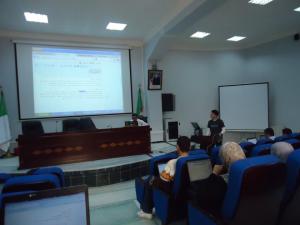As part of the Arabic Language Initiative, I had the chance to visit Algeria in the last week of April, where I had the privilege to speak to students at Médéa University (Médéa Province) about Wikipedia and invite them to contribute to it.
With a size of almost 2,400,000 square kilometers, Algeria is the largest country in Africa and the Arab World, and the tenth-largest country in the world. Algeria has about 4.1 million internet users (12% of the total population of 35 million), however they contribute only 0.08% of the total global edits on Wikimedia projects. While the official language of Algeria is Modern Standard Arabic, French as the ”de-facto” co-official language is still widely used in government, culture, media, and education due to the country’s colonial history. This fact can be clearly noticed in the readership numbers of Wikimedia projects in Algeria: While 52.2% of Wikimedia traffic from Algeria went to French language pages in the first quarter of 2012, Arabic language traffic shared only 30.7%. Having said this, the share of Arabic language traffic has almost doubled in the past three years, from only 17.0% back in mid 2009.
In particular, I could feel the passion for reading and adding content to Arabic language Wikimedia projects during my visit to Médéa University, where I delivered a lecture about contributing to Arabic Wikimedia projects, followed by an editing workshop over two days organized by Dr. Fareh Abdelhak. The introductory lecture laid out the current situation of Wikipedia contributions from Algeria, and a few thoughts on how Wikipedia works, and why is it important to contribute new content to Wikimedia projects. The lecture ended by giving the attendants (about 130, most of them students) a homework exercise: To think of one person they respect and one of their famous quotes, in addition to translating a topic from the English or French Wikipedia or writing an article based other sources that does not exist on the Arabic Wikipedia. Later on, I was informed that the students posted a report in Arabic about the lecture, and shared the homework on Facebook, so more interested people would be able to join the workshop on the next day.

Although Friday was a day off at the university, about 30 students managed to come in the morning to attend the editing workshop. Unfortunately, since most of the university facilities were closed, we couldn’t use the PC rooms and provide every student with a PC. However, this situation did not preclude students from joining the workshop using their private portable PCs, where each group of 3 to 4 students had to share one PC with their colleagues.
The session started by registering a user account on the Arabic Wikiquote. Wikiquote was chosen as a start for two reasons, first to raise awareness about Wikipedia’s sister projects, and secondly in order to enable students adding content directly in their first edits without much interference from the larger Wikimedia community. Most students managed to register an account smoothly, and we started adding pages with the texts that most of the students had prepared as their homework. After students had learned the wiki basics on Wikiquote, we moved to the Arabic Wikipedia to start adding new articles there.
The workshop session resulted in creating 8 new articles on Wikipedia and 10 new pages on Wikiquote. At the end of the workshop, most of the students answered positively to a question on whether they will continue to add content to the Arabic Wikipedia. Indeed, in the evening I noticed that some of the students who attended the workshop went back to the Arabic Wikipedia and Wikiquote and continued improving their previously added articles, and also added new content. Later on, I received a message on my discussion page saying “When we meet next year, I will have already created a number of pages that exceeds yours!”… I really wish you will!
Haitham Shammaa, Editor Growth and Contribution Program consultant

Can you help us translate this article?
In order for this article to reach as many people as possible we would like your help. Can you translate this article to get the message out?
Start translation